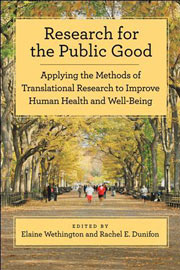By Ted Bocia
Reprinted from Cornell Chronicle, May 10, 2012
 Translational research is often described as a bridge between academia and the outside world, connecting researchers, policymakers and community practitioners to improve human health and development.
Translational research is often described as a bridge between academia and the outside world, connecting researchers, policymakers and community practitioners to improve human health and development.
Now there's a roadmap to help social and behavioral scientists further close the gap -- a new book by College of Human Ecology professors with models and real-world case studies for improving education, health care access and delivery, disease prevention and more via translational research.
Co-edited by Elaine Wethington, professor of human development and of sociology, and Rachel Dunifon, associate professor of policy analysis and management, "Research for the Public Good: Applying the Methods of Translational Research to Improve Human Health and Well-Being" (American Psychological Association Books, released May 15 includes chapters by experts in psychology, child development, public policy, sociology, gerontology, geriatrics and economics. The book grew out of the second Biennial Urie Bronfenbrenner Conference, a cross-disciplinary gathering of leading experts in the social sciences and medical fields held at Cornell in October 2009.
In recent years, Wethington said, translational research has been closely associated with medicine, where billions are spent annually to develop new treatments and interventions to combat sickness. But increasingly the National Institutes of Health and other major funding agencies are calling for social scientists to address issues relevant to human health and to collaborate with medical scientists to improve application of basic findings to communities.
"Translational research has gained prominence in biomedical research, where there's an emphasis on speeding lab findings into practice," she added. "It also goes back to the work of Urie Bronfenbrenner and his colleagues, however, who were ahead of their time with an ecological approach to human development that brought together research, policy and practice. This book defines the term in that context and provides practical insights for doing translational research."
Graduate students and early-career scientists unfamiliar with translational research methods should find the book valuable, Wethington said. "There is a surge of interest in the field right now, so the book should be a great resource," she said.
Numerous Cornell professors contributed chapters and editorial expertise to the book, as well as two students. Helena Herman '11 and Eric Zember '10, M.A. '11, provided research and are co-authors on separate chapters.
The book is the second in a set of five planned in connection with Cornell's Biennial Urie Bronfenbrenner Conference series. The Bronfenbrenner Center for Translational Research, College of Human Ecology, Institute for the Social Sciences and Cornell Cooperative Extension provided funding support.
Ted Boscia is assistant director of communications for the College of Human Ecology.

